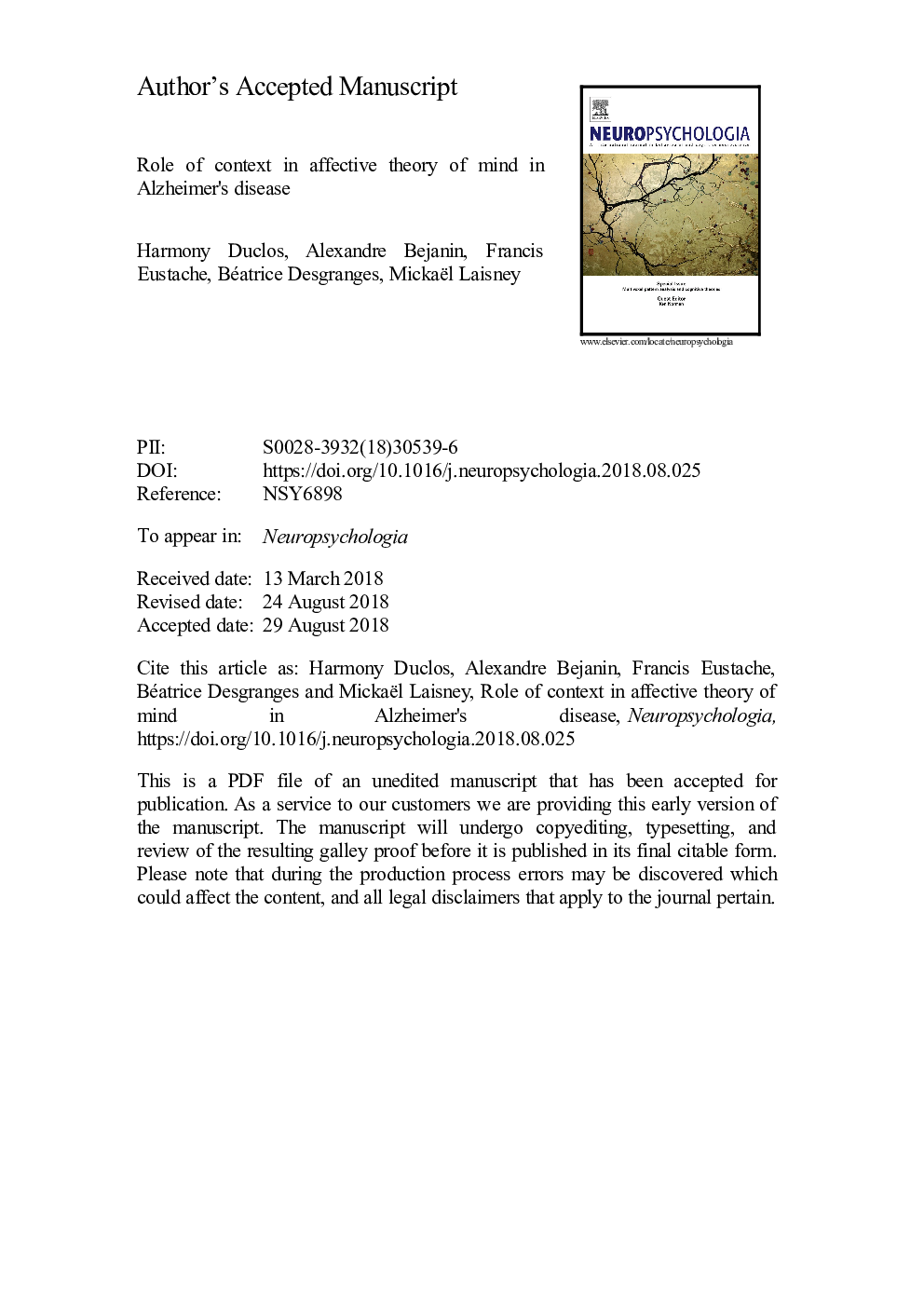| کد مقاله | کد نشریه | سال انتشار | مقاله انگلیسی | نسخه تمام متن |
|---|---|---|---|---|
| 11004688 | 1475537 | 2018 | 40 صفحه PDF | دانلود رایگان |
عنوان انگلیسی مقاله ISI
Role of context in affective theory of mind in Alzheimer's disease
ترجمه فارسی عنوان
نقش زمینه در نظریه عاطفی ذهن در بیماری آلزایمر
دانلود مقاله + سفارش ترجمه
دانلود مقاله ISI انگلیسی
رایگان برای ایرانیان
کلمات کلیدی
بیماری آلزایمر، شناخت احساسی، نظریه ذهن، دانش اجتماعی، متن نوشته،
موضوعات مرتبط
علوم زیستی و بیوفناوری
علم عصب شناسی
علوم اعصاب رفتاری
چکیده انگلیسی
Affective theory of mind (ToM) is defined as the ability to deal with affective mental states. Attributing an affective mental state from a facial expression relies mainly on processes that allow information in the environment to be perceived and decoded. Reasoning processes are required when information is not directly available in the environment (e.g., when making an affective mental state attribution in a social situation where there is no visible facial expression of emotion). Although facial emotion decoding deficits have been reported in Alzheimer's disease (AD), few studies have assessed emotional reasoning processes. Long-term social knowledge may also contribute to mental state attribution, given its involvement in social situations, but the links between these two domains have not yet been properly explored. The aim of the present study was therefore to assess both decoding and reasoning processes in AD, as well as the effect of context on emotion attribution (i.e., whether prior presentation of a congruent vs. noncongruent social situation influences emotion recognition from faces). We also aimed to improve current understanding of the relationship between ToM processes and social knowledge. Participants were 20 patients with AD, 20 healthy older individuals, and 20 healthy young individuals. They performed three tasks testing ToM: a context task (emotion attribution in a social situation); a face task (facial emotion recognition); and a context-face task (determining whether the facial emotion was consistent with the emotion inferred from the social situation, e.g., an embarrassing situation followed by a proud face). All participants underwent a neuropsychological battery that included an assessment of social norm knowledge (e.g., determining whether it is socially acceptable to phone in a church). Results showed deficits in the patients with AD for decoding emotions from faces and for reasoning about emotions inferred from a social context. Patients were found to consider contextual information in such a way that congruency either helped or hindered the decoding of stimuli in the environment. As expected, we found that ToM abilities were linked to social norm knowledge. Overall, our findings suggest that patients with AD have difficulty attributing emotional mental states, and deficits in social norm knowledge and the presence of incongruent information may heighten this difficulty.
ناشر
Database: Elsevier - ScienceDirect (ساینس دایرکت)
Journal: Neuropsychologia - Volume 119, October 2018, Pages 363-372
Journal: Neuropsychologia - Volume 119, October 2018, Pages 363-372
نویسندگان
Harmony Duclos, Alexandre Bejanin, Francis Eustache, Béatrice Desgranges, Mickaël Laisney,
